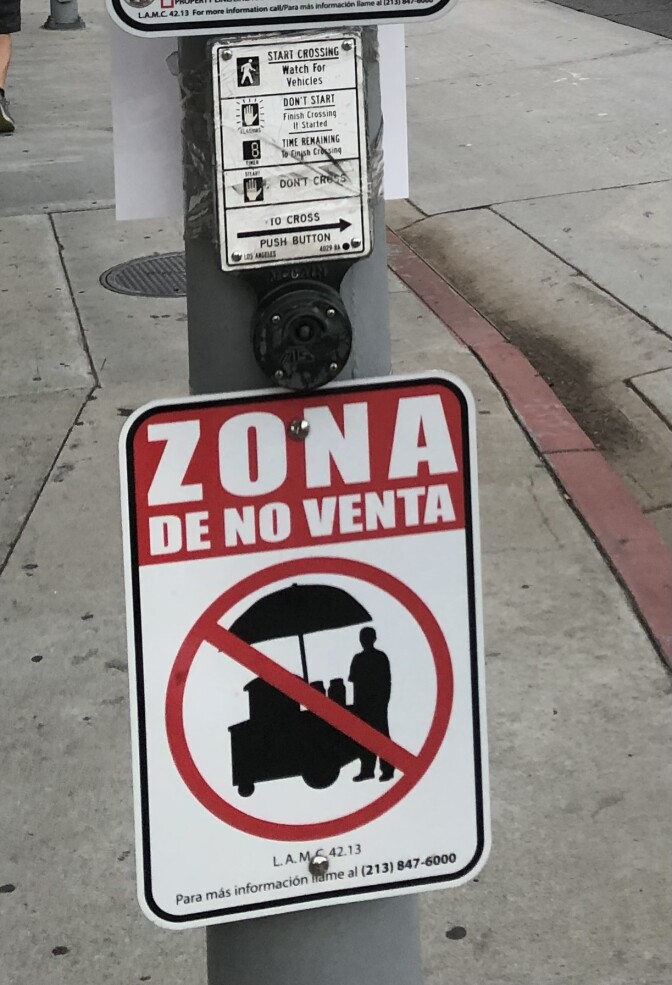This story is free to read because readers choose to support LAist. If you find value in independent local reporting, make a donation to power our newsroom today.
LA agrees to lift restrictions on street vendors and cancel fines to settle lawsuit

Thousands of street vendors can now sell their food and merchandise outside of Dodger Stadium, the Hollywood Walk of Fame and other popular destinations around Los Angeles without fear of being ticketed or harassed by law enforcement.
Attorneys representing vendors announced Friday that a settlement has been reached in a lawsuit filed on behalf of two merchants in late 2022 against the city’s “unlawful and discriminatory barriers” to street vending. The lawsuit argued that the eight “no-vending zones” around L.A. — as well as other vending restrictions — violated state law. In February, the City Council voted to eliminate those zones, but the lawsuit takes the issue further by addressing fines and citations that resulted from the ban.
“We’re sending a strong message to other cities in California,” said Doug Smith, senior director of policy and legal strategy at the nonprofit Inclusive Action for the City, a plaintiff in the suit. He’s worked with the L.A. Street Vendor Campaign for more than a decade and said “the days of redlining vendors out of their communities is over.”
Settlement details
Vendors still have to comply with health regulations, but are now able to operate more freely. A ban on street vending within 500 feet of farmers markets and schools will be fully repealed. All citations issued to vendors for violating these bans will also be canceled, and any fines that vendors have paid will be refunded.
The city has also set up programs to bring vendors into the policymaking process and to change the way it approaches enforcement.
Merlín Alvarado, a street vendor and plaintiff in the lawsuit, said they are ready to work with the city to make its sidewalk vending program as successful as possible.
“The bans are gone, and the vendors have been vindicated,” Alvarado said in a statement. “Street vending is one of our city’s great traditions and resources, and we look forward to being fully recognized for our role as community caretakers and contributors.”
Community celebration
Dozens of street vendors and advocates held a news conference Friday on Hollywood Boulevard to celebrate the legal settlement.
“I feel very proud to be here as part of a community of vendors that recognizes that we deserve much better, and that has not stopped fighting to protect our traditions and our culture,” said Ana Cruz, a street vending organizer with the group Community Power Collective, another plaintiff in the suit.

Cruz used to run a hot dog cart in the Hollywood area, formerly designated as one of the city’s no-vending zones. She recalled feeling “blinded” by flashlights one night during an interaction with police and getting fined for violating the ban.
“I went out to work that afternoon to find a way to bring food to my family, and because I was a street vendor they were treating me like a criminal,” she said.
The lawsuit was filed by the groups Community Power Collective, East L.A. Community Corporation, and Inclusive Action for the City, along with vendors Alvarado and Ruth Monroy.
The settlement is expected to be approved by Mayor Karen Bass and a full City Council vote in August.
Other victories for street vendors
Both California and the city of L.A. decriminalized street vending in 2018, but it’s taken years for local jurisdictions to work out regulations. Last month, the L.A. City Council passed an ordinance to significantly reduce the cost of an annual street vending permit. In a unanimous vote, the price was slashed from $541 to $27.51. Officials also rescinded so-called “no street vending zones” in February.
In L.A. County, a new “streamlined process” for street food vendors and home cooks to get permits will go into effect in November. The motion was introduced by Supervisor Holly Mitchell last fall. An estimated 50,000 sidewalk vendors and home cooks work across the county.








